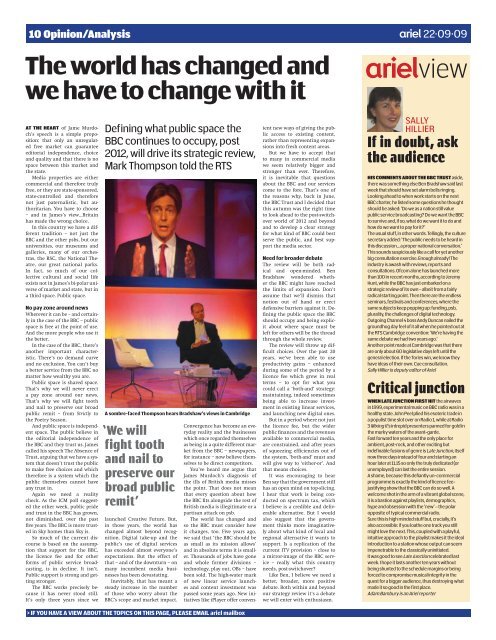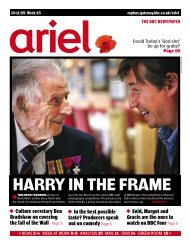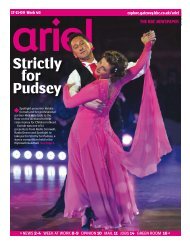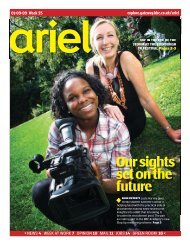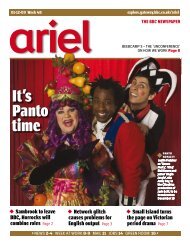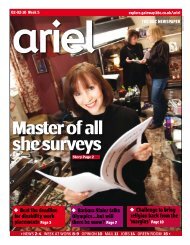to see an electronic edition of this week's Ariel - Ex-bbc.net
to see an electronic edition of this week's Ariel - Ex-bbc.net
to see an electronic edition of this week's Ariel - Ex-bbc.net
Create successful ePaper yourself
Turn your PDF publications into a flip-book with our unique Google optimized e-Paper software.
10 Opinion/Analysis<br />
The world has ch<strong>an</strong>ged <strong>an</strong>d<br />
we have <strong>to</strong> ch<strong>an</strong>ge with it<br />
At the heArt <strong>of</strong> Jame Murdoch’s<br />
speech is a simple proposition:<br />
that only <strong>an</strong> unregulated<br />
free market c<strong>an</strong> guar<strong>an</strong>tee<br />
edi<strong>to</strong>rial independence, choice<br />
<strong>an</strong>d quality <strong>an</strong>d that there is no<br />
space between <strong>this</strong> market <strong>an</strong>d<br />
the state.<br />
Media properties are either<br />
commercial <strong>an</strong>d therefore truly<br />
free, or they are state-sponsored,<br />
state-controlled <strong>an</strong>d therefore<br />
not just paternalistic, but authoritari<strong>an</strong>.<br />
You have <strong>to</strong> choose<br />
– <strong>an</strong>d in James’s view…Britain<br />
has made the wrong choice.<br />
In <strong>this</strong> country we have a different<br />
tradition – not just the<br />
BBC <strong>an</strong>d the other psbs, but our<br />
universities, our museums <strong>an</strong>d<br />
galleries, m<strong>an</strong>y <strong>of</strong> our orchestras,<br />
the RSC, the National Theatre,<br />
our great national parks.<br />
In fact, so much <strong>of</strong> our collective<br />
cultural <strong>an</strong>d social life<br />
exists not in James’s bi-polar universe<br />
<strong>of</strong> market <strong>an</strong>d state, but in<br />
a third space. Public space.<br />
No pay zone around news<br />
Wherever it c<strong>an</strong> be – <strong>an</strong>d certainly<br />
in the case <strong>of</strong> the BBC – public<br />
space is free at the point <strong>of</strong> use.<br />
And the more people who use it<br />
the better.<br />
In the case <strong>of</strong> the BBC, there’s<br />
<strong>an</strong>other import<strong>an</strong>t characteristic.<br />
There’s no dem<strong>an</strong>d curve<br />
<strong>an</strong>d no exclusion. You c<strong>an</strong>’t buy<br />
a better service from the BBC no<br />
matter how wealthy you are.<br />
Public space is shared space.<br />
That’s why we will never erect<br />
a pay zone around our news.<br />
That’s why we will fight <strong>to</strong>oth<br />
<strong>an</strong>d nail <strong>to</strong> preserve our broad<br />
public remit – from Strictly <strong>to</strong><br />
the Poetry Season.<br />
And public space is independent<br />
space. The public believe in<br />
the edi<strong>to</strong>rial independence <strong>of</strong><br />
the BBC <strong>an</strong>d they trust us. James<br />
called his speech The Absence <strong>of</strong><br />
Trust, arguing that we have a system<br />
that doesn’t trust the public<br />
<strong>to</strong> make free choices <strong>an</strong>d which<br />
therefore is a system which the<br />
public themselves c<strong>an</strong>not have<br />
<strong>an</strong>y trust in.<br />
Again we need a reality<br />
check. As the ICM poll suggested<br />
the other week, public pride<br />
<strong>an</strong>d trust in the BBC has grown,<br />
not diminished, over the past<br />
five years. The BBC is more trusted<br />
in Sky homes th<strong>an</strong> Sky is.<br />
So much <strong>of</strong> the current discourse<br />
is based on the assumption<br />
that support for the BBC,<br />
the licence fee <strong>an</strong>d for other<br />
forms <strong>of</strong> public service broadcasting,<br />
is in decline. It isn’t.<br />
Public support is strong <strong>an</strong>d getting<br />
stronger.<br />
The BBC works precisely because<br />
it has never s<strong>to</strong>od still.<br />
It’s only three years since we<br />
Defining what public space the<br />
BBC continues <strong>to</strong> occupy, post<br />
2012, will drive its strategic review,<br />
Mark Thompson <strong>to</strong>ld the RTS<br />
A sombre-faced Thompson hears Bradshaw’s views in Cambridge<br />
‘We will<br />
fight <strong>to</strong>oth<br />
<strong>an</strong>d nail <strong>to</strong><br />
preserve our<br />
broad public<br />
remit’<br />
launched Creative Future. But,<br />
in those years, the world has<br />
ch<strong>an</strong>ged almost beyond recognition.<br />
Digital take-up <strong>an</strong>d the<br />
public’s use <strong>of</strong> digital services<br />
has exceeded almost everyone’s<br />
expectations. But the effect <strong>of</strong><br />
that – <strong>an</strong>d <strong>of</strong> the downturn – on<br />
m<strong>an</strong>y incumbent media businesses<br />
has been devastating.<br />
Inevitably, that has me<strong>an</strong>t a<br />
steady increase in the number<br />
<strong>of</strong> those who worry about the<br />
BBC’s scope <strong>an</strong>d market impact.<br />
Convergence has become <strong>an</strong> everyday<br />
reality <strong>an</strong>d the businesses<br />
which once regarded themselves<br />
as being in a quite different market<br />
from the BBC – newspapers,<br />
for inst<strong>an</strong>ce – now believe themselves<br />
<strong>to</strong> be direct competi<strong>to</strong>rs.<br />
You’ve heard me argue that<br />
James Murdoch’s diagnosis <strong>of</strong><br />
the ills <strong>of</strong> British media misses<br />
the point. That does not me<strong>an</strong><br />
that every question about how<br />
the BBC fits alongside the rest <strong>of</strong><br />
British media is illegitimate or a<br />
partis<strong>an</strong> attack on psb.<br />
The world has ch<strong>an</strong>ged <strong>an</strong>d<br />
so the BBC must consider how<br />
it ch<strong>an</strong>ges, <strong>to</strong>o. Five years ago,<br />
we said that ‘the BBC should be<br />
as small as its mission allows’<br />
<strong>an</strong>d in absolute terms it is smaller.<br />
Thous<strong>an</strong>ds <strong>of</strong> jobs have gone<br />
<strong>an</strong>d whole former divisions –<br />
technology, play out, OBs – have<br />
been sold. The high-water mark<br />
<strong>of</strong> new linear service launches<br />
<strong>an</strong>d content investment was<br />
passed some years ago. New initiatives<br />
like iPlayer <strong>of</strong>fer conven-<br />
> IF YOU HAVE A VIEW ABOUT THE TOPICS ON THIS PAGE, PLEASE EMAIL ariel mailbox<br />
ient new ways <strong>of</strong> giving the public<br />
access <strong>to</strong> existing content,<br />
rather th<strong>an</strong> representing exp<strong>an</strong>sions<br />
in<strong>to</strong> fresh content areas.<br />
But we have <strong>to</strong> accept that<br />
<strong>to</strong> m<strong>an</strong>y in commercial media<br />
we <strong>see</strong>m relatively bigger <strong>an</strong>d<br />
stronger th<strong>an</strong> ever. Therefore,<br />
it is inevitable that questions<br />
about the BBC <strong>an</strong>d our services<br />
come <strong>to</strong> the fore. That’s one <strong>of</strong><br />
the reasons why, back in June,<br />
the BBC Trust <strong>an</strong>d I decided that<br />
<strong>this</strong> autumn was the right time<br />
<strong>to</strong> look ahead <strong>to</strong> the post-switchover<br />
world <strong>of</strong> 2012 <strong>an</strong>d beyond<br />
<strong>an</strong>d <strong>to</strong> develop a clear strategy<br />
for what kind <strong>of</strong> BBC could best<br />
serve the public, <strong>an</strong>d best support<br />
the media sec<strong>to</strong>r.<br />
Need for broader debate<br />
The review will be both radical<br />
<strong>an</strong>d open-minded. Ben<br />
Bradshaw wondered whether<br />
the BBC might have reached<br />
the limits <strong>of</strong> exp<strong>an</strong>sion. Don’t<br />
assume that we’ll dismiss that<br />
notion out <strong>of</strong> h<strong>an</strong>d or erect<br />
defensive barriers against it. Defining<br />
the public space the BBC<br />
should occupy <strong>an</strong>d being explicit<br />
about where space must be<br />
left for others will be the thread<br />
through the whole review.<br />
The review will throw up difficult<br />
choices. Over the past 20<br />
years, we’ve been able <strong>to</strong> use<br />
productivity gains – enh<strong>an</strong>ced<br />
during some <strong>of</strong> the period by a<br />
licence fee which grew in real<br />
terms – <strong>to</strong> opt for what you<br />
could call a ‘both-<strong>an</strong>d’ strategy:<br />
maintaining, indeed sometimes<br />
being able <strong>to</strong> increase investment<br />
in existing linear services,<br />
<strong>an</strong>d launching new digital ones.<br />
But in a period where not just<br />
the licence fee, but the wider<br />
public fin<strong>an</strong>ces <strong>an</strong>d the revenues<br />
available <strong>to</strong> commercial media,<br />
are constrained, <strong>an</strong>d after years<br />
<strong>of</strong> squeezing efficiencies out <strong>of</strong><br />
the system, ‘both-<strong>an</strong>d’ must <strong>an</strong>d<br />
will give way <strong>to</strong> ‘either-or’. And<br />
that me<strong>an</strong>s choices.<br />
It was encouraging <strong>to</strong> hear<br />
Ben say that the government still<br />
has <strong>an</strong> open mind on <strong>to</strong>p-slicing.<br />
I hear that work is being conducted<br />
on spectrum tax, which<br />
I believe is a credible <strong>an</strong>d deliverable<br />
alternative. But I would<br />
also suggest that the government<br />
thinks more imaginatively<br />
about what kind <strong>of</strong> local <strong>an</strong>d<br />
regional alternative it w<strong>an</strong>ts <strong>to</strong><br />
support. Is a replication <strong>of</strong> the<br />
current ITV provision – close <strong>to</strong><br />
a mirror-image <strong>of</strong> the BBC service<br />
– really what <strong>this</strong> country<br />
needs, post-switchover?<br />
Like Ben, I believe we need a<br />
better, broader, more positive<br />
debate. Both within <strong>an</strong>d beyond<br />
our strategy review it’s a debate<br />
we will enter with enthusiasm.<br />
a 22·09·09<br />
aview<br />
SALLY<br />
HILLIER<br />
If in doubt, ask<br />
the audience<br />
hIS COMMeNtS ABOUt the BBC trUSt aside,<br />
there was something else Ben Bradshaw said last<br />
week that should have set alarm bells ringing.<br />
Looking ahead <strong>to</strong> when work starts on the next<br />
BBC charter, he listed some questions he thought<br />
should be asked: ‘Do we as a nation still value<br />
public service broadcasting? Do we w<strong>an</strong>t the BBC<br />
<strong>to</strong> survive <strong>an</strong>d, if so, what do we w<strong>an</strong>t it <strong>to</strong> do <strong>an</strong>d<br />
how do we w<strong>an</strong>t <strong>to</strong> pay for it?’<br />
The usual stuff, in other words. Tellingly, the culture<br />
secretary added: ‘The public needs <strong>to</strong> be heard in<br />
<strong>this</strong> discussion… a proper national conversation.’<br />
This sounds suspiciously like a call for yet <strong>an</strong>other<br />
big consultation exercise. Enough already! The<br />
industry is awash with reviews, reports <strong>an</strong>d<br />
consultations. Ofcom alone has launched more<br />
th<strong>an</strong> 100 in recent months, according <strong>to</strong> Jeremy<br />
Hunt, while the BBC has just embarked on a<br />
strategic review <strong>of</strong> its own – albeit from a fairly<br />
radical starting point. Then there are the endless<br />
seminars, festivals <strong>an</strong>d conferences, where the<br />
same subjects keep popping up: funding, psb,<br />
plurality, the challenges <strong>of</strong> digital technology.<br />
Outgoing Ch<strong>an</strong>nel 4 boss Andy Dunc<strong>an</strong> nailed the<br />
groundhog day feel <strong>of</strong> it all when he pointed out at<br />
the RTS Cambridge convention: ‘We’re having the<br />
same debate we had two years ago.’<br />
Another point made at Cambridge was that there<br />
are only about 60 legislative days left until the<br />
general election. If the Tories win, we know they<br />
have ideas <strong>of</strong> their own. Cue consultation.<br />
Sally Hillier is deputy edi<strong>to</strong>r <strong>of</strong> <strong>Ariel</strong><br />
Critical junction<br />
WheN LAte JUNCtION FIrSt hIt the airwaves<br />
in 1999, experimental music on BBC radio was in a<br />
healthy state. John Peel plied his esoteric trade in<br />
a populist time slot over on Radio 1, while at Radio<br />
3 Mixing It’s intrepid presenters p<strong>an</strong>ned for gold in<br />
the murky waters <strong>of</strong> the av<strong>an</strong>t-garde.<br />
Fast forward ten years <strong>an</strong>d the only place for<br />
ambient, post-rock, <strong>an</strong>d other exciting but<br />
indefinable fusions <strong>of</strong> genre is Late Junction, itself<br />
now three days instead <strong>of</strong> four <strong>an</strong>d starting <strong>an</strong><br />
hour later at 11.15 so only the truly dedicated (or<br />
unemployed) c<strong>an</strong> last the entire session.<br />
A shame, because <strong>this</strong> defi<strong>an</strong>tly un-commercial<br />
programme is exactly the kind <strong>of</strong> licence feejustifying<br />
show that the BBC c<strong>an</strong> do so well. A<br />
welcome shot in the arm <strong>of</strong> a vibr<strong>an</strong>t global scene,<br />
it is a bastion against playlists, demographics,<br />
hype <strong>an</strong>d obsession with the ‘new’ – the polar<br />
opposite <strong>of</strong> typical commercial radio.<br />
Sure <strong>this</strong> is high minded stuff but, crucially, it’s<br />
also accessible: if you loathe one track you still<br />
might love the next. This, coupled with a playful,<br />
intuitive approach <strong>to</strong> the playlist makes it the ideal<br />
introduction <strong>to</strong> a station whose output c<strong>an</strong> <strong>see</strong>m<br />
impe<strong>net</strong>rable <strong>to</strong> the classically uninitiated.<br />
It was good <strong>to</strong> <strong>see</strong> Late Junction celebrated last<br />
week. I hope it lasts <strong>an</strong>other ten years without<br />
being shunted <strong>to</strong> the schedule margins or being<br />
forced <strong>to</strong> compromise musical integrity in the<br />
quest for a bigger audience, thus destroying what<br />
made it so good in the first place.<br />
Adam Bambury is <strong>an</strong> <strong>Ariel</strong> reporter


